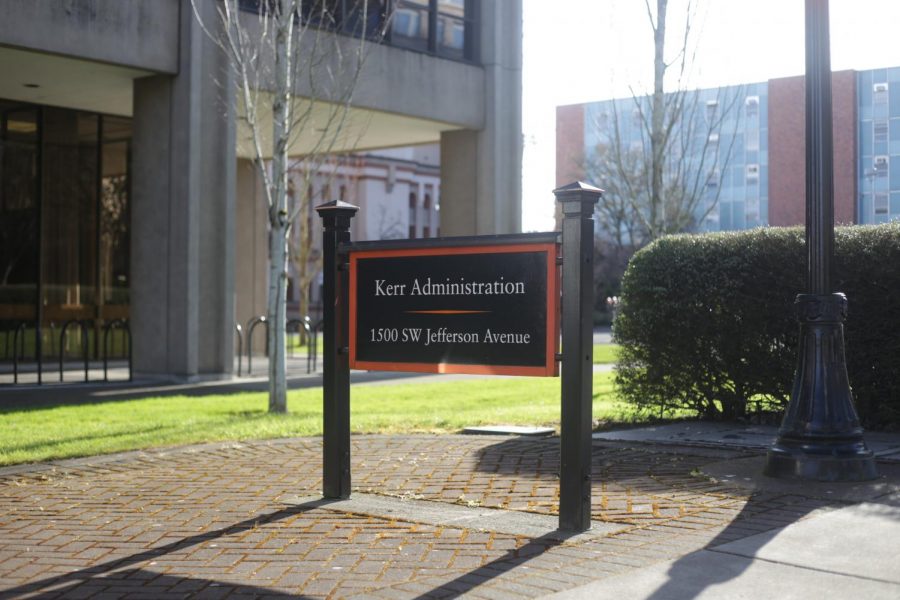OSU Board of Trustees approves new tuition increase
April 2, 2021
The Oregon State University Board of Trustees met Friday to approve a new increase of tuition rates for the 2021-22 academic year.
The increase will be 2.5% for continuing undergraduates, and 4% for new undergraduates at OSU.
Sherman Bloomer, a member of the OSU Board of Trustees, said the increase is needed to avoid a deficit he calls the sliding scale of increases per year.
“This goes to thinking of tuition as a cohort; each cohort of students that comes to the university will have a tuition rate,” Bloomer said. “Once students commit to the institution, the institution is going to try to make a commitment to them to keep tuition rates low around the rate of inflation so there is predictability for them and they have an idea of what their total costs are going to be. New students that are coming in will see the whole price, and see the price it will cost them to come to OSU, and will be able to plan for that, and that increase will give the institution a way to make some additional investments that those students will see through the time they are at OSU.”
Several members of the board had questions regarding the increase, and its effects on low income students. Another Trustee, Preston Pulliams, was worried about how low-income students will be affected by this.
“Can I then assume…this projected increase—along with the increases in funding related to the government and also financial aid—that this increase will buffer what perhaps what low income financial needs will be?” Pulliams asked.
Bloomer responded saying that government investments in financial aid will cover a “great deal” of the tuition increase.
“It will cover a great deal of the increase,” Bloomer said. “What it won’t fill in necessarily is pre-pandemic, if we look at all of the aid we have, there is still a large amount of unmet need.”
Khawater Hussein, the student member of the Board of Trustees, voiced her concerns over the increase, citing that people “are not getting the services they need” in the middle of a pandemic.
“People are getting exhausted. I commend the effort that professors and instructors [have] in trying so hard to adjust regardless, to continue to do this again and again, to find new ways of teaching regardless of the struggles they have to go through themselves because of the pandemic,” Hussein said. “It just feels like, at this point us raising tuition again, I understand when it comes to inflation and all that, but I do think it is necessary at this point to cut it from different places and for the state to step up, because we need that money right now.”
Hussein also added that she doesn’t think “education should be this expensive,” and the reason why she was planning on voting no on the measure.
Sami Al-Abdrabbuh, a former OSU instructor and current chair of the Corvallis School District Board of Directors, was the only member of the public to give public comment.
“I’m going to speak here on my own behalf, however I want to bring the lived experiences of myself and the students I’ve taught related to tuition increases. I feel very seriously about the impact of it,” Al-Abdrabbuh said. “I do understand institutional systems where inflation and cost of living and all of these things are important, and there is a need to invest more into some resources and services that the university is focusing on.”
Al-Abdrabbuh calls the services that the university offers “life saving.”
“For example, social services, basic needs of all our students, responding to the needs that they have on a daily basis. I see the impact of those services impacting the students I’ve taught when I was teaching at Oregon State University. They are life saving, they help them navigate troubling times, especially in the past year or so during COVID[-19]. However, I want to seriously caution any increase of cost and tuition might lead to a decision to defer them to continue studying at Oregon State University,” Al-Abdrabuh said.
Al-Abdrabbuh said he was worried about the effect these increases would have on students who were not able to qualify for financial aid.
“I encourage seriously to look into the impact of any increase in an equity lens, which means those who have the most need deserve the most resources and the least impact of any increase.” Al-Abdrabbuh said. “Inflation is not an average for our students, and it differs from one student to another, some of them are losing their jobs. I’ve worked with students who have had to navigate the whole household, navigating COVID[-19] and quarantining while they wanted to work on their programming assignments and find a router and a modem to connect with me, or someone who had to live in their car… [who had to drive] 30 minutes to connect to the Internet. In that lens and in these lived experiences, I highly encourage and recommend not to implement tuition increases at this time.”
Al-Abdrabbuh said he understood the burden of increasing services, but said that it is “not the time for our students to take that burden.”
However, the board took a voice vote, where the tuition increases were approved.
Following the vote, Board Chair Rani Borkar thanked the trustees for a “good and rich discussion.”


















































































![Newspaper clipping from February 25, 1970 in the Daily Barometer showing an article written by Bob Allen, past Barometer Editor. This article was written to spotlight both the student body’s lack of participation with student government at the time in conjunction with their class representatives response. [It’s important to note ASOSU was not structured identically to today’s standards, likely having a president on behalf of each class work together as one entity as opposed to one president representing all classes.]](https://dailybaro.orangemedianetwork.com/wp-content/uploads/2025/03/Screenshot-2025-03-12-1.00.42-PM-e1741811160853.png)
























